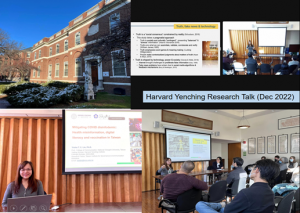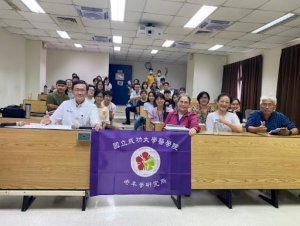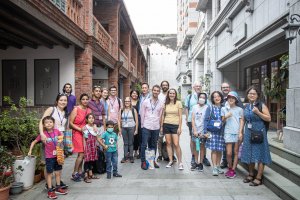“Where are you from?” is a question almost every Asian American has grown up hearing (in addition to its ruder close cousin—“What are you?”). I’ve bristled at that question, swinging from being patient and polite—“You mean where are my parents from?”—to snarky—“New Jersey.” It’s a question that rankles because it assumes foreignness and otherness, one that, in my own country, feels unfair. In America, aren’t we almost all, in some shape or form, descended from somewhere else? And yet Asian Americans are usually the ones perpetually called out for it. There was a short period of time when I would have insisted I was American, and American only. That eventually gave way to my own sense of pride in how I saw myself—as both Asian American and Chinese American—and I decided that I alone could determine what those terms meant to me.
I came to Taiwan to do research for a novel based on the experiences of post-1949 immigrants from mainland China. As a descendant of three grandparents who came from China, and one grandparent, my maternal grandmother, who was Taiwanese, I was very interested in the stories of relocation, immigration, homesickness, and assimilation of these migrants, as well as the stories of their children. What was it like, I wondered, to be from one place but have to adjust to somewhere new not of your choosing, and never be allowed to go home again? What was it like for their children, who were neither Chinese nor completely seen as benshengren (despite the fact that some of them had one local Taiwanese parent)? Mostly, I was moved by the sense of homelessness and longing in the few stories I had heard. My own grandfather had left Shanghai in his late teens and never saw his mother again. The tragedy of their separation haunted me.
It never occurred to me that the very process of researching the answers to these questions would lead me to questions about my own identity. When I first arrived in Taiwan, I tried, painfully, to fit in. My Chinese accent is, if not perfect, pretty close, and I’d been told by people that if I didn’t say too much (giving myself away with my imperfect syntax and childish vocabulary), they wouldn’t be able to tell I wasn’t Taiwanese. So I carefully rehearsed what I would say in every interaction, looking up words I didn’t recognize on menus so I didn’t have to fall back on English, preparing myself for all possible follow-up questions. I desperately wanted to be seen as “local,” someone who could pass for Taiwanese. But inevitably someone would ask me something using a phrase I didn’t understand, or their speech would be so fast I couldn’t catch what had been said. “什麼?” I’d ask, and then the gig was up. They’d look at me with confusion, I’d look at them in helplessness, and then they’d start speaking slowly, using gestures. Sometimes they’d even switch to English. My cheeks burned with embarrassment every time that happened.
I gave up and switched tactics. “不好意思,我是美國人,” I started to announce at the beginning of any interaction I predicted might be difficult. Maybe if I told everyone I was American from the start, I’d be saved the humiliation of being found out. Instead, the person I was having that conversation with (a waitress at a restaurant or a salesperson at a store) usually gave me a confused look. Why was I telling them this? I could see them wondering. Why was I apologizing?
Still, despite all of this, I experienced very little culture shock when I moved here. In fact, I told my friends that I’d never felt more at ease anywhere else. At first I didn’t know why this was. Sure, I’d been brought up to feel very culturally Taiwanese, but I was also very American, and therefore very different from many of the local Taiwanese who lived here. But then I began to identify why I felt so comfortable: in Taiwan, all the things about me that were deemed “weird” back home—my love of Asian dramas, my craving for tea eggs, my habit of bowing three times at my relatives’ graves, even my middle name, which is my Chinese name—all of those things are completely and totally normal here. I didn’t have to explain those aspects of myself to anyone. I’m not sure that anyone who isn’t a hyphenated person in America can understand this, but for me, this normalizing of aspects of myself that had always been deemed “strange” by Americans flooded me with relief. In America, at best, these were things that I’d have to take time to explain, and at worst, were things I was made to feel embarrassed or ashamed of. I woke up every morning in Taiwan grateful that there was a place in the world in which all the things that had marked me as an outsider in America were things that nobody batted an eye at.
You might ask, what about the American aspects of me? Surely those things would have made me similarly foreign in Taiwan? While that’s true to a certain extent, it’s not quite the same. In Taiwan (as in most places in the world), American culture is widespread. Even if not all aspects of American culture are practiced here, the people here still have a familiarity with it, either through movies and TV shows, or through meeting the many foreigners who pass through. In a world where Western culture is still privileged to a certain degree, these differences don’t necessarily mark me as odd or an outcast, but rather are often seen as interesting or even cool.
As I settled into life in Taiwan, I began to let go of my anxieties about “passing” or of being “found out.” I learned to have conversations like a normal person, to not apologize for misunderstanding something, to let the fact that I was American come into conversation naturally. If I didn’t understand something, I asked. If I needed help, I asked. I still felt a twinge of embarrassment every time I used the wrong word or couldn’t read something, but I felt grateful to have the opportunity to be embarrassed. I felt myself growing into the person I wanted to be, and I was grateful for that growth.
At the same time, I was starting my research and I began to understand the complicated greater political context of the questions I was asking. It was easy enough to want to know the stories of the migrants, many of whom were KMT soldiers, and these stories were in abundance, if no longer easily available firsthand. And yet, it was hard for me to ignore the equally tragic backdrop of the local Taiwanese whose lives were trampled upon in the wake of the KMT’s defeat. The line from the 228 Incident back in 1947 to the Taiwanese Independence Movement today is a clear one, and suddenly, as someone with three waishengren grandparents (though none of them were in the military), I began to feel ambivalent—both about my own role in history and in my project itself.
Even though I had grown up viewing the KMT as the underdogs, the ones who had been defeated by Communist China, I could not ignore the fact that in Taiwan they had acted as oppressors. What did that make me? What did it mean for my project? How could I paint these soldiers’ stories as tragedies, paint them as victims of a sort, while knowing that the governments they belonged to had wreaked such devastation upon the people of Taiwan?
To complicate things further, through my travels I began to befriend people from Taiwanese indigenous groups and it became apparent that this history of suffering couldn’t just be isolated to the local Taiwanese. What about what the Han people had done to the indigenous populations? My mind reeled at the many layers of violence and oppression that had been wrought on this island. And at the top of this pyramid was me: a Han Chinese with ancestral ties to mainland China, and an American to boot. If I had privilege anywhere, it was here.
It was hard for me to know what to do with this information. Just as I had initially oscillated between trying to pass for Taiwanese and announcing who I really was, I went through a period when I felt the need to make clear that I was waishengren whenever I met a new Taiwanese friend. I didn’t want to lie about who I was, didn’t want to pretend I was of full Taiwanese descent if I had no right to it. But then, worried about awkwardness, I would swing back and say nothing about my grandparents, and say simply that both of my parents were born in Taiwan, which was true. On the tip of my tongue were always apologies, and yet part of me also resisted. I wanted to be able to be proud of who I was. But who was I? I had grown up nearly my entire life calling myself Chinese American, albeit one who felt culturally Taiwanese. But here I was, a waishengren, with one benshengren grandparent. Could I say I was Taiwanese? Would that be a lie?
One afternoon, I wrote my advisor, a sociology professor at Academia Sinica who specialized in waishengren studies, in a guilt-induced panic. I told him I felt the identity politics were so complicated in Taiwan that I felt paralyzed. How I could represent everything objectively or politically correctly in my writing? What was I supposed to do with the guilt in my conscience?
“Don’t think of yourself as having to be a speaker of the Taiwanese identity issue,” he wrote back. “That work is for historians or social scientists. I think you should feel free, unlimited by political camps, to explore all sides.”
So I attempted to do that. Even as I tried to understand the homelessness that the veterans from China felt with empathy and compassion, I also felt it was important to interrogate them about the atrocities the KMT had wreaked during their early reign. I visited the Green Island prison and the 228 Museum alongside the War Museums in Kinmen and the National Palace Museum. I tried to understand the politics of Taiwan objectively, researched what the blue and green parties stood for, and tried my best to make my own judgments, separate from what my parents (who are blue) had taught me as I was growing up. I tried to understand what people meant when they said, “I’m Taiwanese” and what they meant when they said, “I’m Chinese.” I tried to understand if it always necessarily coded that one meant green and one meant blue.
Still, I was confused. Maybe it’s because I’m from America, where identity politics often mean acknowledging the hyphenated identities of individuals, but I believed I was both Taiwanese and Chinese, and I didn’t want to have to choose. I felt pride in the history of China while feeling most at home with the culture of Taiwan. I recognized my grandparents’老家 in Ningbo while still also feeling the kindredness of Taipei, my grandmother’s childhood home, in my bones. Yet, in a country where identity often informs your politics and vice versa, that dual identity didn’t seem to be an option in Taiwan.
At the Fulbright China research conference in March, one of the presenters mentioned that hardly anyone in Taiwan would consider themselves either Chinese or Chinese Taiwanese today. “There used to be this identity, this middle identity of Chinese Taiwanese. But it doesn’t exist anymore,” he said. “Taiwanese don’t have hyphenated identities.”
That night I went home and called my boyfriend and cried. “This thing that I think I believe I am,” I blubbered, “that thing doesn’t exist anymore. Does that mean I’m not allowed to be what I believe I am?”
I didn’t want to lie about my confusion anymore, nor did I want to feel like I was understating who I was to my friends. I began to ask them—Taiwanese, Kinmenese, indigenous, and waishengren—about identity. I was honest with them about who I am, who I was brought up to believe I am, and the questions I had. I wanted to know, too, who they believed they were. Are you Taiwanese and Indigenous? Are you Kinmenese and Taiwanese? Do you, as a descendant of waishengren, feel anything towards your ancestral homes?
One evening, I was in Taitung, drinking beers outside with a friend who is part of the Amis tribe. It was dusk, and mosquitoes were buzzing around, biting my ankles and thighs. I told him about my questions, my confusion. I might have sounded a tad desperate, thanks to the alcohol.
“You know,” he said, “when my grandfather was alive, he believed he was Japanese, because he grew up under Japanese rule. My father believed he was Chinese, because he grew up under KMT rule. Today, I believe I’m Taiwanese, but of course I’m also indigenous.” He paused then, sipping on his beer.
“I think you can be who you want to be. I think being Taiwanese today means nobody can tell you who you are except you. Being Taiwanese means whatever you want it to mean.”
Today, even though my Chinese has improved, I still get people who ask me where I’m from when I speak. Sometimes they try to guess, based on my accent and affect. Sometimes they say that I sound Chinese, sometimes Singaporean. They say I 卷舌 too much, even though when I’m in China, they think I’m Taiwanese because I don’t do it enough. They rarely guess I’m American, because my accent isn’t what they expect of a typical American, but they can always tell I’m not quite from here. I feel a little ache in my chest when I’ve been outed, but I’ve learned to take it in a stride. In fact, I’ve learned to see it as a blessing. Interesting conversations have occurred when someone learns I’m not from Taiwan. They want to know where I’m from, why I’m here. They exclaim that my Chinese is really good for an American (which, while not quite as good as being just plain good, is a compliment I’ll happily take anyway). Sometimes they’re surprised I can speak Chinese at all.
Politics try to distill messy questions into black and white certainties, but I don’t believe art, or life, is that simple. I’m still researching and writing about the stories of waishengren like I originally planned, but with an awareness and mindfulness of everything else I’ve learned. I don’t have all the answers, but I don’t think a novel is about answers; a novel is about questions and I have many of them. I have a main character who is like me, a person caught in between, a person with both guilt and pride and plenty of confusion. A person who realizes politics can often be bound up in identity, but still wants to be able to self-determine. A person trying to learn. Through her, I hope to continue to ask the questions I don’t have answers for.
Recently, I saw a Taiwanese Independence rally near 228 Memorial. “We are Taiwanese,” their signs read. I felt sadness and indignation then, felt the unfairness that the people of this country could not determine their own sovereignty. This is their home, I thought. Why don’t they get to determine who they are?
A week later, I saw a group of old veterans and their children protesting outside of Ximen. “We are Taiwanese and we are Chinese,” their signs read. Again, I felt something, a sadness at their sense of homelessness and displacement. Isn’t this also their home? I wondered. Why don’t they also get to determine who they are?
When people ask me now who I am, I tell them I’m Taiwanese Chinese American. It’s possible that no one else in the world believes this identity exists, yet for now, it’s the truest representation of who I feel I am. In any case, it’s only three simple words, far too simple to encompass the complexity of my ethnic, national, and cultural identities. Perhaps one day, after more thinking, more experiences, and more questions, I’ll revise that label again. After all, a label is only a static thing. An identity is the thing that is constantly evolving.
Post Views: 3,652







